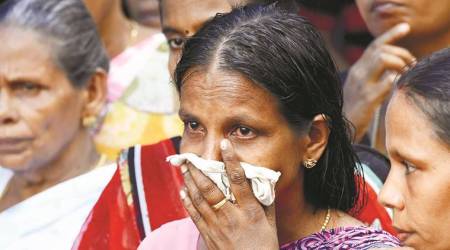 Policemen outside Hadiya’s house in T V Puram village. Express photo
Policemen outside Hadiya’s house in T V Puram village. Express photo
ARMED policemen keep an eye on every movement in the vicinity of a small house in this village, vehicles passing by are checked, and strangers told to show their identity. A policeman monitors footage of CCTV cameras installed across the premises. Search lights come up at night, and there are generators for standby power. Two more policewomen are on permanent duty inside, keeping a watch on a 24-year-old, day in and out.
The woman being “guarded” by the State machinery is Akhila alias Hadiya, the 24-year-old whose marriage to a Muslim man, Shefin Jahan, was annulled by the Kerala High Court on May 24.
She was sent to this house, belonging to her parents, 35 km from Kottayam district town, three days later by the court, which said “a girl of 24 years is weak and vulnerable, capable of being exploited in many ways…. Her marriage being the most important decision in her life can also be taken only with the active involvement of her parents.”
While her parents alleged that the wedding was just a bid to take their daughter to join the Islamic State, in its report to the high court, police said they had found no evidence that Jahan had any criminal links.
Jahan, 27, challenged the high court verdict in the Supreme Court. On August 10, the Supreme Court asked the state police to share details of the conversion of the Hindu woman with the National Investigation Agency.
Hadiya hasn’t left her parents’ house in the two and a half months since the high court gave her custody to her father, K M Ashokan.
Jahan, who lives 130 km away, in Kollam, says he has had no communication with her in all this time. He hasn’t been able to talk to her as she has no access to mobile phones. “I had sent a letter to her, but her father returned it with the acknowledgement ‘rejected by the guardian’. Once I went to TV Puram to visit her, but police did not allow me to enter the house.”
Kottayam District Superintendent of Police N Ramachandran says it is a unique case. “Police are giving round-the-clock security to the woman and her parents. The high court had directed protection for them. They fear a threat, which can come from any quarters.”
A police officer in Kottayam says, “We have intelligence reports that the woman and her parents face serious threat from Islamic fundamentalists. We have advised the family not to let the woman outside as it may endanger her life.”
The officer adds that it is wrong to call it house arrest. “It is for her security. Prof T J Joseph had faced threat from Islamic fundamentalists on the charges of insulting the Prophet. He faced a brutal attack for want of security (Joseph’s right hand was chopped off in July 2010). We don’t want such a situation.”
Hadiya’s father Ashokan, an ex-serviceman, says he will only talk after the case in the Supreme Court gets over. His voice breaking, he says, “I am fighting for the custody of my only daughter. I won’t allow anyone to meet her.”
Sheela Sureshan, a panchayat member of T V Puram village, confirms no one has seen Hadiya since she returned home. “We have heard she is still leading an Islamic way of life, sometimes observing fast and reading the Quran.”
Jahan reiterates that as an adult, Hadiya has every right to practise a religion of her choice. “By confining her within the house, her family is now attempting a forced conversion. That is why Hadiya is not allowed to speak. She is still my wife,” says Jahan.
Jahan had met Hadiya through a Muslim matrimonial website last August. The marriage was held on December 19 last year, and they lived together only for two days before Hadiya was hauled before the high court. The court sent her to a hostel in Kochi while it heard her father’s petition. No one was allowed to meet her there too.
Because he had to stay back to fight the case, Jahan, who had been working in Muscat with a private firm as administration manager for the last two years, has lost his job. His parents are settled there. “My company told me to return to the Gulf only after settling the matter,” he says.
A graduate in Islamic Studies, Jahan had been an active member of the Campus Front, the student outfit of the Social Democratic Party of India (SDPI), during his college days. The SDPI is a political wing of the hardline Islamist group Popular Front of India, and a criminal case was registered against Jahan in 2013 in connection with campus politics.
While hearing the habeas corpus petition filed by Ashokan, the high court had asked police to look into Jahan’s antecedents. Police found no evidence that Jahan had any criminal links, but wrote in its report that he had been admin of a WhatsApp group called ‘SDPI Keralam’, and been in another called ‘Thanal’, that included core members of the SDPI Kerala. A youth arrested from Kannur last year in connection with an Islamic State module, Mansy Buraqui, police added, had been a member of the same two WhatsApp groups.
Jahan had defended that Buraqui was removed from the groups after his IS support was revealed, and that he had no link with him apart from sharing WhatsApp groups.

